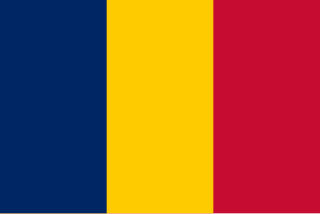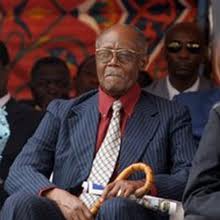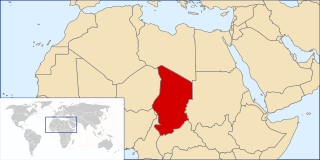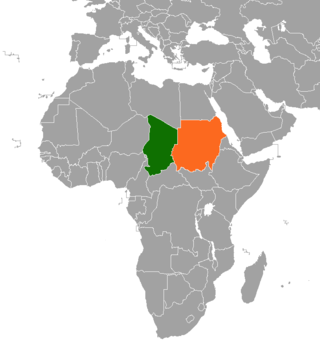Chad, officially the Republic of Chad, is a landlocked country in Central Africa. It borders Libya to the north, Sudan to the east, the Central African Republic to the south, Cameroon and Nigeria to the southwest, and Niger to the west. Due to its distance from the sea and its largely desert climate, the country is sometimes referred to as the "Dead Heart of Africa".
The Chad National Army consists of the five Defence and Security Forces listed in Article 185 of the Chadian Constitution that came into effect on 4 May 2018. These are the National Army, the National Police, the National and Nomadic Guard (GNNT) and the Judicial Police.

Chad, officially the Republic of Chad, is an independent state at the crossroads of North and Central Africa. The landlocked country is bordered by Libya to the north, Sudan to the east, the Central African Republic to the south, Cameroon to the southwest, Nigeria to the southwest, and Niger to the west. Chad has a population of 16 million, of which 1.6 million live in the capital and largest city of N'Djamena. With a total area of around 1,284,000 km2, Chad is the fifth-largest country in Africa and the twentieth largest nation by area in the world.

François Tombalbaye, also known as N'Garta Tombalbaye, was a Chadian politician who served as the first President of Chad from the country's independence in 1960 until his overthrow in 1975. A dictatorial leader, his divisive policies as president led to factional conflict and a pattern of authoritarian leadership and political instability that are still relevant in Chad today.
Goukouni Oueddei is a Chadian politician who served as President of Chad from 1979 to 1982.

FROLINAT was an insurgent rebel group active in Chad between 1966 and 1993.

Félix Malloum or Félix Malloum Ngakoutou Bey-Ndi was a Chadian military officer and politician who served as the second President of Chad from 1975 to 1978.
Wadel Abdelkader Kamougué was a Chadian politician and army officer. Kamougué was a leading figure in the 1975 coup d'état and subsequently held several positions in the Chadian government and legislature. He was Vice President of Chad from 1979 to 1982 and President of the National Assembly from 1997 to 2002. Kamougué was also President of the Union for Renewal and Democracy (URD) political party, and he was appointed as Minister of National Defense in April 2008.

Chad was a part of the French colonial empire from 1900 to 1960. Colonial rule under the French began in 1900 when the Military Territory of Chad was established. From 1905, Chad was linked to the federation of French colonial possessions in Middle Africa, known from 1910 under the name of French Equatorial Africa. Chad passed in 1920 to French civilian administration, but suffered from chronic neglect.
The 1975 coup d'état in Chad that terminated Tombalbaye's government received an enthusiastic response in the capital N'Djamena. Félix Malloum emerged as the chairman of the new Supreme Military Council, and the first days of the new regime were celebrated as many political prisoners were released. His government included more Muslims from northern and eastern Chad, but ethnic and regional dominance still remained very much in the hands of southerners.
The Transitional Government of National Unity was the coalition government of armed groups that nominally ruled Chad from 1979 to 1982, during the most chaotic phase of the long-running civil war that began in 1965. The GUNT replaced the fragile alliance led by Félix Malloum and Hissène Habré, which collapsed in February 1979. GUNT was characterized by intense rivalries that led to armed confrontations and Libyan intervention in 1980. Libya intervened in support of the GUNT's President Goukouni Oueddei, against the former GUNT Defence Minister Hissène Habré.
Ibrahim Abatcha was a Muslim Chadian politician reputed of Marxist leanings and associations. His political activity started during the decolonization process of Chad from France, but after the country's independence he was forced to go in exile due to the increasing authoritarianism of the country's first President François Tombalbaye. To overthrow Tombalbaye he founded in Sudan in 1966 the FROLINAT, of which he was the first leader and field commander. Two years later he was killed in a clash with the Chadian Army.
The 1975 Chadian coup d'état was in considerable part generated by the growing distrust of the president of Chad, François Tombalbaye, for the army. This distrust came in part from the Chadian Armed Forces (FAT) incapacity to deal with the rebellion that was inflaming the Muslim north from when the rebel insurgent group FROLINAT had been formed in 1966.

The Chadian–Libyan War was a series of military campaigns in Chad between 1978 and 1987, fought between Libyan and allied Chadian forces against Chadian groups supported by France, with the occasional involvement of other foreign countries and factions.
Opération Bison was a French military operation in Chad from 1969 to 1972.

Throughout its history, Darfur has been the home to several cultures and kingdoms, such as the Daju and Tunjur kingdoms. The recorded history of Darfur begins in the seventeenth century, with the foundation of the Fur Sultanate by the Keira dynasty. In 1875, the Anglo-Egyptian condominium in Khartoum ended the dynasty. The British allowed Darfur a measure of autonomy until formal annexation in 1916. However, the region remained underdeveloped through the period of colonial rule and after independence in 1956. The majority of national resources were directed toward the riverine Arabs clustered along the Nile near Khartoum. This pattern of structural inequality and overly underdevelopment resulted in increasing restiveness among Darfuris. The influence of regional geopolitics and war by proxy, coupled with economic hardship and environmental degradation, from soon after independence led to sporadic armed resistance from the mid-1980s. The continued violence culminated in an armed resistance movement around 2003.

The populations of eastern Chad and western Sudan established social and religious ties long before either nation's independence, and these remained strong despite disputes between governments. In recent times, relations have been strained due to the conflict in Darfur and a civil war in Chad, which both governments accuse the other of supporting.
Chad achieved independence in 1960. At the time, it had no armed forces under its own flag. Since World War I, however, southern Chad, particularly the Sara ethnic group, had provided a large share of the Africans in the French army. Chadian troops also had contributed significantly to the success of the Free French Forces in World War II. In December 1940, two African battalions began the Free French military campaign against Italian forces in Libya from a base in Chad, and at the end of 1941, a force under Colonel Jacques Leclerc participated in a spectacular campaign that seized the entire Fezzan region of southern Libya. Colonel Leclerc's 3,200-man force included 2,700 Africans, the great majority of them southerners from Chad. These troops went on to contribute to the Allied victory in Tunisia. Chadians, in general, were proud of their soldiers' role in the efforts to liberate France and in the international conflict.
The National Union for Independence and Revolution was the ruling party in Chad between 1984 and 1990. It was founded in June 1984 by President Hissène Habré as a successor of his Armed Forces of the North, the insurgent group through which Habré had conquered power in 1982. The party was banned six years later by Idriss Déby when he assumed power by overthrowing Habré in the 1990 coup d'état.

The Chadian Civil War of 1965–1979 was waged by several rebel factions against two Chadian governments. The initial rebellion erupted in opposition to Chadian President François Tombalbaye, whose regime was marked by authoritarianism, extreme corruption, and favoritism. In 1975 Tombalbaye was murdered by his own army, and a military government headed by Félix Malloum emerged and continued the war against the insurgents. Following foreign interventions by Libya and France, the fracturing of the rebels into rival factions, and an escalation of the fighting, Malloum stepped down in March 1979. This paved the way for a new national government, known as "Transitional Government of National Unity" (GUNT).











